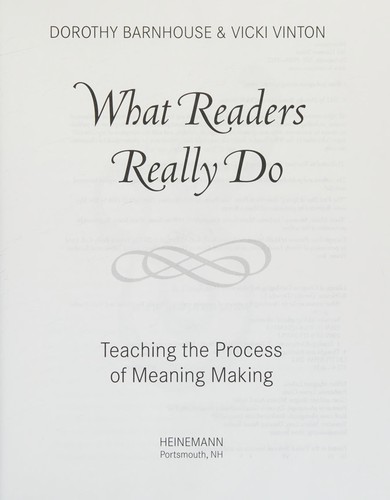Vanessa reviewed What readers really do by Dorothy Barnhouse
Review of 'What readers really do' on 'Goodreads'
5 stars
Update: More stars, because this book has deeply influenced the way I am thinking about teaching reading.
Also,
New blog post by V. Vinton that describes some open-mindedness necessary for a strong reader.
http://tomakeaprairie.wordpress.com/2013/01/02/auld-lang-syne-some-new-years-thoughts-by-way-of-don-murray/
"It seems unadvisable to me, as well, for a reader to know where he or she’s going (at least the first time through a text); for if we did know, there wouldn’t really be any need to keep turning the pages. Not knowing is what keeps us engaged; it’s what propels us forward. And it’s what helps us keep our minds open and receptive to whatever surprises the text holds. If you think, after all, that you know where you’re going, there’s little incentive to attend to the words, especially to those subtle shifts and hints that herald change—until, perhaps, you find yourself lost, which happens to students all the time.
"Unfortunately, however, many of the …
Update: More stars, because this book has deeply influenced the way I am thinking about teaching reading.
Also,
New blog post by V. Vinton that describes some open-mindedness necessary for a strong reader.
http://tomakeaprairie.wordpress.com/2013/01/02/auld-lang-syne-some-new-years-thoughts-by-way-of-don-murray/
"It seems unadvisable to me, as well, for a reader to know where he or she’s going (at least the first time through a text); for if we did know, there wouldn’t really be any need to keep turning the pages. Not knowing is what keeps us engaged; it’s what propels us forward. And it’s what helps us keep our minds open and receptive to whatever surprises the text holds. If you think, after all, that you know where you’re going, there’s little incentive to attend to the words, especially to those subtle shifts and hints that herald change—until, perhaps, you find yourself lost, which happens to students all the time.
"Unfortunately, however, many of the strategies we teach children to use, such as predicting and picture walks—and even connecting and accessing schema—work against this open mindset by encouraging students to form ideas before they even start reading. And as Murray says in yet another line that has implications for readers: “Beginning writers make the mistake of looking for ideas before beginning to write.”
. . .
As readers, however, we can’t revise the clues or patterns the writer has laid down; what we have to keep revising instead is what we think those patterns and clues reveal and what insights they might be leading us to. And to do this, once again, we have to apply Murray’s writing words to readers: “You discover what [the text has] to say by letting go of preconceptions.”"

